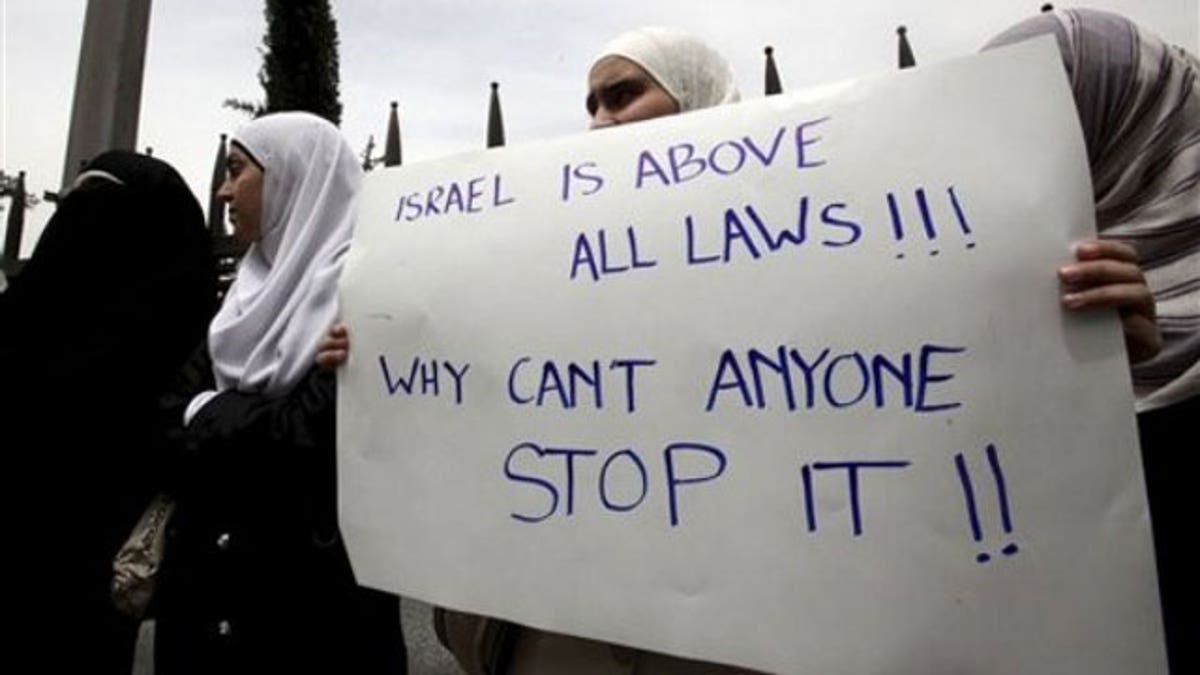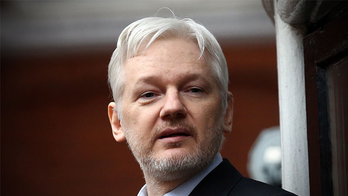
June 1: Jordanian students carry a banner during a rally in support of Turkey, in front of the University of Jordan in Amman, Jordan, after Monday's deadly commando raid by Israeli forces on ships taking humanitarian aid to the blockaded Gaza Strip. Poster reads 'Israel is above all laws, why can't anyone stop it' (AP).
The deadly Israeli raid on ships taking humanitarian aid to the Gaza Strip has sent a shock pulse through the international community.
Though the United States is urging against a rush to judgment, Israel's longstanding critics immediately condemned the early morning raid Monday as a criminal act. As details trickled out about the circumstances of the confrontation that left at least nine pro-Palestinian activists dead -- all of them on a Turkish ship that refused to allow a cargo inspection -- it became clear the incident would have widespread diplomatic implications.
The raid comes in the middle of several delicate diplomatic negotiations, any of which could be set back by the incident. Israeli peace talks have been thrown into doubt, and the incident could imperil efforts to win tough sanctions on Iran at the United Nations.
The following is a summary of the potential fallout from the conflict for several countries that have a stake in the incident.
The incident immediately put heavy pressure on Israel to end its blockade of the Gaza Strip, implemented in 2007 after Hamas took control of the region.
U.N. Secretary-General Ban Ki-moon on Tuesday told Reuters that Israel should lift the blockade, saying the raid "would not have happened" if the policy had not been in place. The Israeli newspaper Haaretz in an editorial declared the raid "the price of flawed policy."
Egypt on Tuesday opened its crossing point with the Gaza Strip -- and with the pro-Palestinian activists sending another boat to Gaza, Israel's enforcement of the blockade will once again be tested.
Israel, which claims its soldiers acted in self-defense, could face an investigation. The U.N. Security Council called for an inquiry Tuesday after a nearly 12-hour meeting. Protesters demonstrated outside Israeli embassies as news of the raid spread.
As Prime Minister Benjamin Netanyahu cancelled a scheduled visit to Washington to handle the crisis, a pair of peace talks could be thrown into doubt -- not just Israeli-Palestinian talks, but Israeli-Syrian talks, which Turkey's foreign minister said Ankara would put on hold.
The situation also doesn't help U.S.-Israeli relations, which were already strained and faced additional tension last week when the United States did not object to a resolution in the United Nations that called on Israel to disclose its alleged nuclear program while ignoring Iran.
United States
The Israeli raid threatened to potentially disrupt the effort by the United States in the U.N. Security Council to put a package of economic sanctions on Iran. It's already taken months longer than anticipated for the United Nations to take up the sanctions push, meant to punish Iran for pursuing its nuclear weapons program. But the effort to sanction Iran, one of Israel's greatest enemies, could slow as criticism of Israel builds.
Importantly, Turkey and Brazil last month brokered an alternative plan to sanctions that would allow Iran to send nuclear material outside of the country in exchange for reactor-ready fuel rods. That plan threw a curveball at the sanctions effort -- and international sympathy toward Turkey after the flotilla raid could lead to the proposal having a second look.
A new report on Monday, though, declared that Iran has enough nuclear material to build two nuclear weapons -- a declaration that could undermine the Brazil-Turkey plan.
The United States is inevitably in a tough spot at the United Nations. Though the United States pushed for a softer U.N. statement on the flotilla raid, Turkey's foreign minister on Tuesday demanded the U.S. condemn Israel's actions.
Iran
Israel's loss is Iran's gain. Iranian President Mahmoud Ahmadinejad used the deadly raid to blast Israel and call for strong United Nations action against the country.
Ahmadinejad in a speech called for the Security Council to "cut off" Israel's hands with a "strong resolution." The unified condemnation of Israel among the 57 Muslim nations, led now by Iran and Turkey, could shift attention at the United Nations away from sanctions on Tehran and toward actions against Israel.
Turkey
Turkey led the charge against Israel in the aftermath of the raid. Four of the nine dead are confirmed to be from Turkey and the rest are believed to be Turkish but are not confirmed. Foreign Minister Ahmet Davutoglu called the raid "murder conducted by the state."
The conflict appeared to put an immediate freeze on Israeli-Turkish relations. A former Israeli diplomat was quoted saying a "total rupture" in ties with Turkey is possible. This would be significant, as Turkey is considered one of Israel's few allies in the Muslim world. The two countries have military ties and conduct billions of dollars in trade, though their relationship has been on the decline since Israel's late 2008 offensive in Gaza.
Turkey recalled its ambassador to Israel after the Monday raid and canceled scheduled military exercises.
As for U.S.-Turkish relations, Foreign Minister Ahmet Davutoglu was in Washington Tuesday to meet with Secretary of State Hillary Clinton. He told reporters: "I have to be frank: I am not very happy with this statement from Washington yesterday. We expect a clear condemnation."




